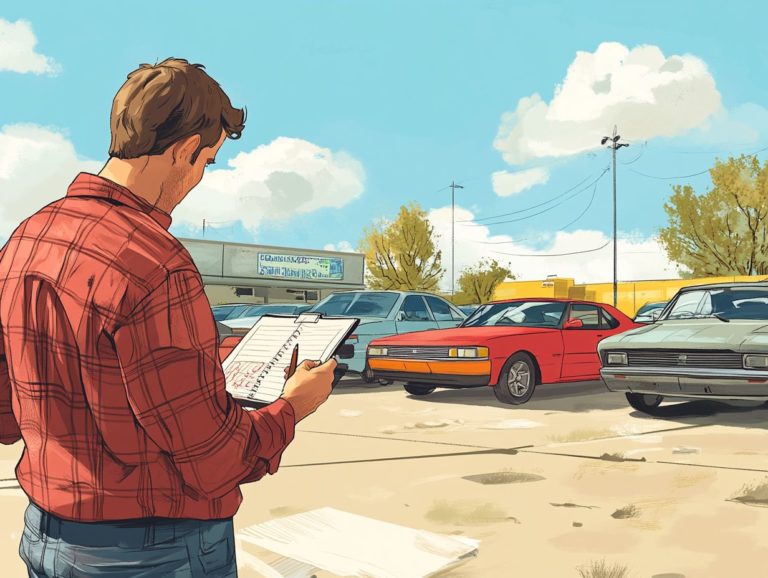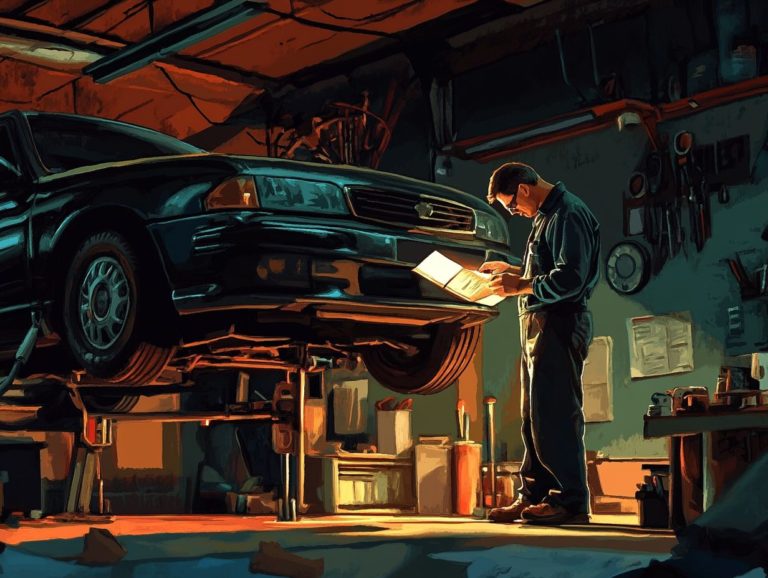What to Avoid in a Used Car Deal
Purchasing a used car can be an exhilarating journey, but it s essential to approach the process with care. From avoiding common pitfalls and scams to delving into the vehicle’s history, there are vital steps that will ensure you make a wise investment.
This guide equips you with everything you need to know, from meticulously inspecting the vehicle’s condition to negotiating the price and handling the paperwork. It also offers valuable insights on what to consider post-purchase to safeguard your investment. Get ready to make a smart choice!
Contents
- Key Takeaways:
- Understanding the Risks of Buying a Used Car
- Researching the Car’s History
- Inspecting the Car’s Condition
- Negotiating the Price
- Finalizing the Purchase
- What to Do After Buying a Used Car
- Frequently Asked Questions
- What should I avoid in a used car deal?
- Should I buy a used car without getting a pre-purchase inspection?
- What are some red flags to look out for in a used car deal?
- Is it a good idea to buy a used car from a private seller?
- What should I do if the used car I’m interested in has a salvage title?
- How can I avoid paying too much for a used car?
Key Takeaways:

- Be aware of common pitfalls and scams when buying a used car to avoid being taken advantage of.
- Research the car’s history through a vehicle history report and look out for red flags to avoid purchasing a problematic vehicle.
- Thoroughly inspect the car’s condition, paying attention to key areas and potential signs of problems, before finalizing the purchase.
Understanding the Risks of Buying a Used Car
Purchasing a used car can be an exhilarating journey, yet it carries its fair share of risks that you should be acutely aware of. Unreliable vehicle histories, unexpected maintenance issues, and a range of scams lurking in the used car market can certainly dampen the excitement.
Whether you re buying from a well-established dealer or exploring a private sale, it s vital for you to understand the details about financing choices, interest rates, and your consumer rights. This knowledge enables you to make informed decisions and protect your investment effectively.
Common Pitfalls and Scams
When you navigate the used car market, it s essential to stay alert to common pitfalls and scams. These can include misleading advertisements and hidden fees that unexpectedly inflate the cost of your vehicle.
One prevalent concern is odometer fraud, where sellers change the mileage to make a car seem less used, leading to unforeseen repair costs down the line.
You might also find yourself facing high-interest financing schemes that can ensnare you in long-term debt. This can make the overall cost of ownership far steeper than you originally anticipated.
Safeguard yourself by carefully verifying loan terms and thoroughly understanding every aspect of the total cost of ownership. This includes examining potential hidden fees often masked by enticing pricing offers from dealerships.
This empowers you to make a smarter purchase.
Researching the Car’s History
Researching the history of a used car is an essential step in your buying journey. It offers vital insights into the vehicle’s past, revealing details about accidents, ownership history, and any potential title issues.
By utilizing reputable sources like CARFAX or AutoCheck, you can uncover critical information that influences both the vehicle’s value and your financing options. This due diligence not only empowers you as a buyer but also helps ensure a smooth and informed purchasing experience.
Importance of Vehicle History Reports
Vehicle history reports are essential tools for you as a used car buyer. They provide a thorough overview of the vehicle’s past that can greatly impact your financing options and negotiation strategies.
These reports offer invaluable insights into critical factors such as previous damage, giving you a glimpse into the car s maintenance history over the years.
You can also delve into detailed maintenance records, which reveal whether the vehicle has been well cared for, further shaping your perception of its quality and reliability.
Understanding the title status especially if the car has a salvage or rebuilt title allows you to assess potential risks and overall value effectively.
Armed with this knowledge, you ll be in a prime position to negotiate prices confidently and tackle any financing challenges that may arise, ensuring your investment is both wise and secure.
Now that you’re equipped with this knowledge, start your search for the perfect used car today!
How to Spot Red Flags

Spotting red flags during the used car buying process is crucial to steer clear of potential pitfalls. These can include mechanical issues that may lead to expensive repairs and poor payment strategies that could result in unfavorable loan terms.
You should always be on the lookout for inconsistent vehicle history reports. These might indicate past accidents or title issues that could significantly diminish the car’s value.
Visible signs of poor maintenance, such as rust or worn-out tires, can indicate a lack of care. This lack of care may lead to increasing expenses down the road.
If a price seems too good to be true, it often hints at hidden problems or urgent sales. This signals the need for thorough due diligence.
A thorough car check not only uncovers these risks but also shapes your financing options. Ultimately, this ensures you make informed decisions while navigating potential traps in the marketplace.
Inspecting the Car’s Condition
Inspecting the condition of a used car is an essential step before you finalize any purchase. This process gives you valuable insights into the vehicle’s reliability, maintenance history, and potential repair costs all factors that can significantly impact your financing options.
Taking the time to thoroughly assess the car ensures you make a well-informed decision.
Key Areas to Examine
- Engine
- Transmission
- Brakes
- Electrical systems
Don t skip the test drive. It s essential for gauging the vehicle’s overall performance.
Start with a thorough examination of the engine. Look for signs of wear or neglect, such as oil leaks or unusual noises these could hint at potential issues down the road.
Next, assess the transmission. Pay close attention to how smoothly it shifts. It should operate without any slipping or jerking, which indicates it’s functioning correctly.
As you check the brakes, inspect the pads and rotors for wear and listen for any unusual sounds when braking. Evaluate the electrical systems too check the battery, lights, and infotainment features to prevent future inconveniences.
Finally, take that test drive. It s a critical step to assess handling, comfort, and responsiveness, enabling you to make informed decisions about your potential new vehicle.
Signs of Potential Problems
Spotting issues during your car inspection can save you from unexpected headaches and costs. It’s essential to pay attention to red flags like strange noises, fluid leaks, and warning lights.
These indicators often hint at underlying issues that could compromise the vehicle’s performance. They may even influence your financing options.
For instance, if you notice excessive rust or warning lights illuminating the dashboard, this could foreshadow costly repairs down the road. Such issues could affect your ability to secure favorable financing terms.
Recognizing these signs can also inform your ongoing maintenance strategy. Vehicles that require frequent repairs might indicate higher long-term ownership costs. By staying vigilant, you enable yourself to make informed decisions that align with your budget and contribute to your long-term satisfaction with the vehicle.
Negotiating the Price
Negotiating the price of a used car is an essential skill that can yield considerable savings for you, especially in a dynamic used car market.
By grasping concepts like trade-in value and Manufacturer’s Suggested Retail Price (MSRP), you enable yourself to negotiate more effectively. This ensures you make the most informed decisions possible.
Tips for Getting a Fair Deal

To secure a fair deal when purchasing a used car, you should equip yourself with knowledge about the vehicle’s market value, financing options, and effective negotiation tactics.
This means diving deep into research on the specific make and model of the car you’re interested in. Utilize resources like Kelley Blue Book and Edmunds to gather accurate pricing information.
These platforms reveal essential insights into both the average market value and any potential dealer markups. Understanding various financing options is equally crucial; explore loans from banks or credit unions to compare interest rates and terms.
By arming yourself with this information, you can confidently enter negotiations. You’ll be equipped with the insights needed to challenge inflated prices and ensure you secure the best possible deal.
Start your research today to find the best deals!
Finalizing the Purchase
Finalizing the purchase of a used car entails several crucial steps. You must complete the necessary paperwork, secure financing, and ensure you have adequate insurance coverage to protect your investment.
Each of these elements plays a vital role in making your acquisition smooth and secure.
Important Paperwork and Steps to Take
- Title Transfer: Establishes your legal ownership.
- Bill of Sale: Acts as a formal record of the transaction.
- Financing Documents: Outline loan details and your obligations.
When finalizing a used car purchase, you will encounter essential paperwork, including the title transfer, bill of sale, and financing documents. Gathering additional documents like the vehicle history report, warranty information, and proof of identity can significantly streamline your process.
Understanding your financing options is vital as it helps you determine what fits comfortably within your budget. Meanwhile, having adequate insurance coverage safeguards you against unforeseen circumstances.
What to Do After Buying a Used Car
After purchasing a used car, it s crucial to take specific steps to guarantee the vehicle’s longevity and reliability. This includes establishing regular maintenance routines and obtaining suitable insurance coverage.
Taking these measures will help you enjoy your vehicle for years to come.
Maintenance and Insurance Considerations
- Routine Service Schedules: Essential for vehicle reliability.
- Gap Insurance: Covers the difference between what you owe and your car’s value if it’s totaled.
- Extended Warranties: Protect against unexpected repair costs.
Regular maintenance ensures your vehicle runs smoothly and extends its lifespan. By sticking to recommended service intervals, you can prevent major issues from arising, ultimately boosting your vehicle s reliability and safety on the road.
Understanding the different insurance options is crucial for protecting your investment. For example, gap insurance can be a lifesaver if your vehicle is totaled. Likewise, extended warranties offer peace of mind.
By combining diligent maintenance with comprehensive insurance coverage, you can enjoy a more worry-free driving experience.
Frequently Asked Questions

What should I avoid in a used car deal?
Avoid buying a car without a thorough inspection, accepting a deal without negotiating, and consider understanding what to look for in a car deal to ensure a smart purchase.
Should I buy a used car without getting a pre-purchase inspection?
No, it is highly recommended to get a pre-purchase inspection before buying a used car. This will help you identify potential issues and avoid hidden problems.
What are some red flags to look out for in a used car deal?
Watch out for sellers unwilling to provide maintenance records, cars with suspiciously low prices, and signs of major accidents or flood damage.
Is it a good idea to buy a used car from a private seller?
Buying a used car from a private seller can be risky because there is no guarantee or warranty. It can be difficult to verify the car’s history. It s better to buy from a reputable dealer who can provide a warranty and certified pre-owned options.
What should I do if the used car I’m interested in has a salvage title?
If you are considering purchasing a used car with a salvage title, make sure to do your research and have it thoroughly inspected by a trusted mechanic. Be prepared for potential challenges with insurance and financing.
How can I avoid paying too much for a used car?
To avoid overpaying for a used car, research the market value of the make and model you want. Get multiple quotes from different dealers or private sellers to find the best price.
Bring a knowledgeable friend or family member to help you talk about the price. Their support can make a big difference during negotiations!






